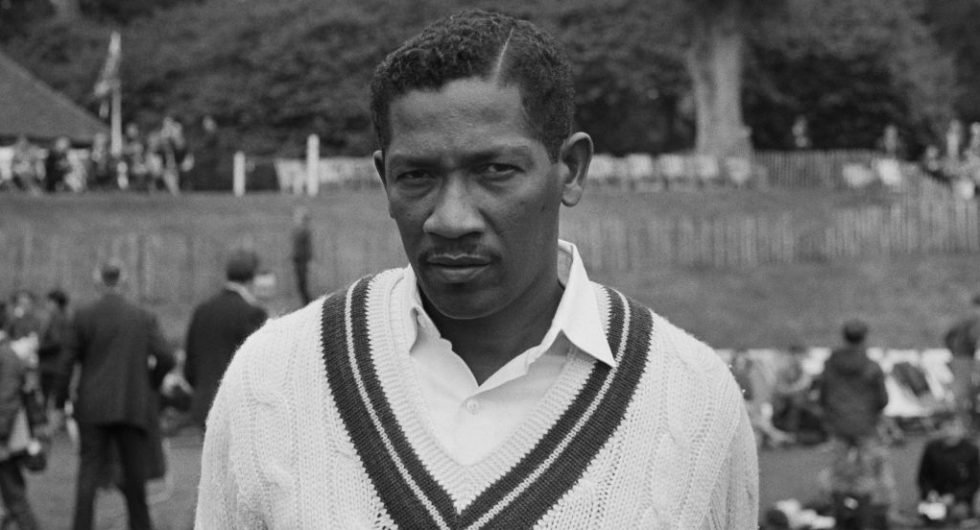Basil Butcher: The ‘Mr Dependable’ of his era – Almanack

The West Indies team was renowned for its strokemakers in the Sixties, but Basil Butcher was often the glue that held the team together. His Wisden obituary celebrated the team’s ‘Mr Dependable’.
Basil Butcher was a bulwark of the West Indian middle order in the Sixties, restraining his attacking instincts to allow the likes of Rohan Kanhai and Garry Sobers to play their natural games. But Butcher was an elegant batsman himself, strong on the cut, and harsh on anything overpitched. He was seen as an lbw candidate, as he sometimes played across the line. “My bat comes down from somewhere about mid-off,” he said. “Maybe if I’d had a coach, I’d only have been clean bowled.” He still averaged 43 in Tests, and just below 50 in first-class matches.
Butcher was born in the sugar-producing village of Port Mourant, in British Guiana (now Guyana). His mother was an Amerindian, making him the first player of native descent known to have represented West Indies. Kanhai lived 200 yards down the road, while Joe Solomon – another steady Test performer – was not much further away. They were among the first from outside the capital, Georgetown, to make a mark on the region’s cricket.
The first signs of Butcher’s talent became apparent in October 1956: an unbeaten 154 against Jamaica, whose attack included the tearaway fast bowler Roy Gilchrist, as well as Test spinners Alf Valentine and Collie Smith. There was another hundred against the 1957/58 Pakistan tourists, but Butcher had to wait until the following season’s trip to the subcontinent – West Indies’ first since the war without any of the Three Ws – for a cap. He grabbed it eagerly, hitting 103 in the third Test against India, and 142 in the fourth.
He was sidelined for a while when Frank Worrell and Clyde Walcott returned, and missed the 1960/61 Australian tour but, buoyed by success in the Lancashire League, was recalled for the trip to England in 1963. And Butcher made sure he would not be left out again, hitting a superb 133 at Lord’s, despite going in shortly after opening a letter from his wife, Pam, telling him she had suffered a miscarriage. Of Butcher’s performance, Alan Ross wrote: “Predominantly an on-side innings, it had a West Indian lavishness to it…swinging from the studious to the impulsive.”
It gave West Indies enough runs to attack on the final day of a drawn Test made famous by Colin Cowdrey’s late emergence with a broken arm.
Without him, West Indies might well have lost: three years later, in the third Test at Trent Bridge, he went one better, transforming probable defeat into victory with a career-best unbeaten 209 in the second innings, although he was dropped five times. West Indies had been 65 for two when he came in, still 25 behind, but Butcher shared careful century stands with Kanhai and Seymour Nurse, then added another 173, rather more quickly, with Sobers.
After a slow start to the 1967/68 home series against England, Butcher made 86 and 60 in the third Test, then unexpectedly enlivened the fourth. Asked to send down his flighty leg-breaks, he nabbed England’s captain Colin Cowdrey for 148, and polished off the tail to finish with 5-34, the only wickets of his Test career (though England won after Sobers’s notorious declaration). “He delivers a googly which is easy to read but turns considerably,” said the watching Brian Close.
Back in England in 1969, Butcher had a quiet time until the third and final Test, at Headingley. Needing 303 to square the series, West Indies seemed set fair at 219-3, with Butcher 91 – but he was given out caught behind off Derek Underwood and, after Sobers fell for a duck, they ended up 30 short. His team-mates were sure Butcher hadn’t hit it, but he was sanguine: “I was out. The umpire said so.” He topped the tour first-class averages with 61, and was named a Wisden Cricketer of the Year in 1970. Jack Barker’s accompanying essay observed: “He has been known to smile during an innings, but rarely before the 400th run.”
There was one other indelible memory of that tour. With Sobers and vice-captain Lance Gibbs given the match off, Butcher took charge for the game against Ireland, the day after the Lord’s Test. On a pudding of a pitch at Sion Mills, he decided to bat first, despite recent rain, and the West Indians were skittled for 25. The Jamaican journalist LD “Strebor” Roberts noted the tourists’ flag was flying upside down: “Half-mast might have been more appropriate.”
Butcher played no more international cricket, but there was still time for an undefeated 203 for Guyana against Barbados in March 1970, and a last hurrah of 162 against Trinidad the following year. He remained in Guyana, mainly working in public relations, and had a spell as a Test selector, before moving late in life to the United States. “He was very reliable – calm, and an excellent player of pace and spin,” said Clive Lloyd. “In many ways, he was the Mr Dependable of that era.”
Butcher, Basil Fitzherbert died on December 16, 2019, aged 86

